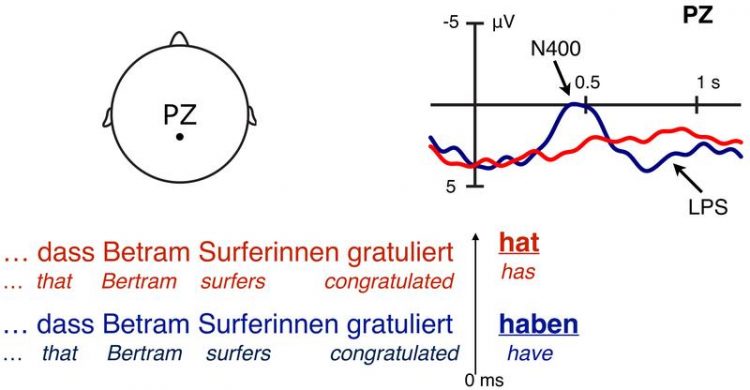Grammar: eventually the brain opts for the easy route

If the first noun in a sentence without a clear case marker («Bertram») does not refer to the agent, the brain activity is stronger (see blue curve). UZH
The grammar of languages keeps reorganizing itself. A prime example of this is the omission of case endings in the transition from Latin to Italian. And in some instances, case systems are remodeled entirely – such as in the transition from Sanskrit to Hindi, which has completely new grammatical cases.
Simplifications found in all languages
An international team of researchers headed by linguist Balthasar Bickel from the University of Zurich conducted statistical analyses of the case systems in more than 600 languages and recorded the changes over time.
They then tested these adaptations experimentally in test subjects, measuring the brain flows that become active during language comprehension. The scientists were therefore able to demonstrate that the brain activity is stronger for complex case constructions than for simple ones.
«Certain case constructions tax the brain more, which is why they are eventually omitted from languages all over the world – independently of the structural properties of the languages or socio-historical factors,» explains Bickel, a professor of general linguistics at the University of Zurich.
In other words, biological processes are also instrumental in grammatical changes. «Our findings pave the way for further studies on the origin and development of human language and a better understanding of speech disorders.»
http://www.mediadesk.uzh.ch/articles/2015/grammatik-mit-der-zeit-macht-es-sich-d…
Media Contact
All latest news from the category: Studies and Analyses
innovations-report maintains a wealth of in-depth studies and analyses from a variety of subject areas including business and finance, medicine and pharmacology, ecology and the environment, energy, communications and media, transportation, work, family and leisure.
Newest articles

NTU and NUS spin-off cutting-edge quantum control technology
AQSolotl’s quantum controller is designed to be adaptable, scalable and cost-efficient. Quantum technology jointly developed at Nanyang Technological University, Singapore (NTU Singapore) and National University of Singapore (NUS) has now…

How Geothermal Energy Shapes Bavaria’s Green Future Through Sustainable Energy
The Bavarian State Ministry of Science and the Arts has extended its funding for the research association “Geothermal Alliance Bavaria,” with the University of Bayreuth (UBT) continuing as a member…

Spintronics memory innovation: A new perpendicular magnetized film
Long gone are the days where all our data could fit on a two-megabyte floppy disk. In today’s information-based society, the increasing volume of information being handled demands that we…



